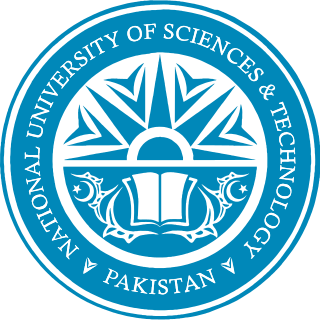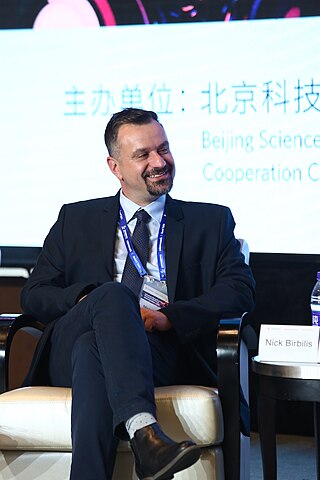Related Research Articles

Carnegie Mellon University (CMU) is a private research university in Pittsburgh, Pennsylvania. The institution was originally established in 1900 by Andrew Carnegie as the Carnegie Technical Schools. In 1912, it became the Carnegie Institute of Technology and began granting four-year degrees. In 1967, it became the current-day Carnegie Mellon University through its merger with the Mellon Institute of Industrial Research, founded in 1913 by Andrew Mellon and Richard B. Mellon and formerly a part of the University of Pittsburgh.

The Australian National University (ANU) is a public research university and member of the Group of Eight, located in Canberra, the capital of Australia. Its main campus in Acton encompasses seven teaching and research colleges, in addition to several national academies and institutes.

The National University of Sciences & Technology (NUST) is a multi-campus public research university with its main campus in Islamabad, Pakistan.

David A. Bader is a Distinguished Professor and Director of the Institute for Data Science at the New Jersey Institute of Technology. Previously, he served as the Chair of the Georgia Institute of Technology School of Computational Science & Engineering, where he was also a founding professor, and the executive director of High-Performance Computing at the Georgia Tech College of Computing. In 2007, he was named the first director of the Sony Toshiba IBM Center of Competence for the Cell Processor at Georgia Tech.

Mehran University of Engineering & Technology is a public research university located in Jamshoro, Sindh, Pakistan focused on STEM education.

Hendrik Wade Bode was an American engineer, researcher, inventor, author and scientist, of Dutch ancestry. As a pioneer of modern control theory and electronic telecommunications he revolutionized both the content and methodology of his chosen fields of research. His synergy with Claude Shannon, the father of information theory, laid the foundations for the technological convergence of the information age.

Harcourt Butler Technical University (HBTU) formerly known as Harcourt Butler Technological Institute (HBTI) is a Premier State Technical University in Kanpur, Uttar Pradesh, India. The HBTU was named after Sir Spencer Harcourt Butler, Governor of the United Provinces in British India. Its programs have been conferred in autonomous status under the university. It is one of the oldest engineering institute in the country and holds NAAC A+ accreditation and ISO 9001:2000 certification. It offers Bachelors, Masters, and Doctoral programs in engineering, natural sciences and humanities as well as Masters programs in Computer Application (MCA) and Business Administration (MBA).

Cybernetics is a wide-ranging field concerned with circular causal processes such as feedback. Norbert Wiener named the field after an example of circular causal feedback—that of steering a ship. The Steersman adjusts the steering to the exact location (goal) in response to the disturbing effects in environment by maintaining and enabling a steady course to be maintained amongst disturbances such as cross-winds, changing wheather conditions or the tide. Steering is thus the first well studyed example of goal oriented (purposefull) behavior. The first time such purposefull behaviour was scientifically explained in the work of Arturo Rosenblueth, Norbert Wiener and Julian Bigelow in article "Behavior, Purpose and Teleology" (1943).
The IEEE Eric E. Sumner Award is a Technical Field Award of the IEEE. It was established by the IEEE board of directors in 1995. It may be presented annually, to an individual or a team of not more than three people, for outstanding contributions to communications technology. It is named in honor of Eric E. Sumner, 1991 IEEE President.

Jabalpur Engineering College (JEC) is an institute located in Jabalpur, Madhya Pradesh, India. It is the oldest technical institution in central India and the 15th-oldest in India. It is the first institute of India to have started the Electronics & Telecommunication engineering education in the country, and also the last educational institution to be set up by the British in India. The Government of Madhya Pradesh is in the process of converting it into a Technical University.
Mandyam Veerambudi Srinivasan AM FRS, also known as "Srini", is an Australian bioengineer and neuroscientist who studies visual systems, particularly those of bees and birds.

Yann André LeCun is a Turing Award winning French computer scientist working primarily in the fields of machine learning, computer vision, mobile robotics and computational neuroscience. He is the Silver Professor of the Courant Institute of Mathematical Sciences at New York University and Vice-President, Chief AI Scientist at Meta.

Siksha 'O' Anusandhan (SOA), formerly Siksha 'O' Anusandhan University (SOA University) is a private deemed university located at Bhubaneswar, Odisha, India. The university is composed of nine degree-granting schools and colleges and has a student body of around 15,000. Many of SOA's programs are nationally accredited, including engineering, medicine, pharmacy, business, nursing, biotechnology, science, humanities, environment, nano technology, materials science, agriculture and law.

Genevieve Bell is an Australian cultural anthropologist, best known for her work at the intersection of cultural practice research and technological development, and for being an industry pioneer of the user experience field. Bell was the inaugural director of the Autonomy, Agency and Assurance Innovation Institute (3Ai), which was co-founded by the Australian National University (ANU) and CSIRO’s Data61, and a Distinguished Professor of the ANU College of Engineering, Computing and Cybernetics. In 2021, she became the inaugural Director of the new ANU School of Cybernetics. She also holds the university's Florence Violet McKenzie Chair, and is the first SRI International Engelbart Distinguished Fellow. Bell is also a Senior Fellow and Vice President at Intel. She is widely published, and holds 13 patents.

The academic structure of the Australian National University is organised as seven academic colleges which contain a network of inter-related faculties, research schools and centres. Each college is responsible for undergraduate and postgraduate education as well as research in its respective field.
The ANU College of Engineering, Computing and Cybernetics is a constituent body of the Australian National University, comprising the School of Computing, School of Engineering, and School of Cybernetics. The College has roughly 150 academic staff, 100 general staff, 200 higher degree research students, and 1,000 undergraduate students.

National Institute of Technology, Delhi is a premier public technical university located in Delhi, India. It has been declared as an Institute of National Importance by an act of Parliament of India. It is one of the 31 National Institutes of Technology in India.

Nick Birbilis is an Australian engineer and academic. He is presently the Executive Dean of the Faculty of Science, Engineering, and Built Environment, at Deakin University. Birbilis was previously the Dean, and Deputy Dean of the College of Engineering and Computer Science at the Australian National University. He is of Greek-Australian background. Birbilis works in the field of materials science and engineering, having made contributions in the area of materials design, materials durability and materials characterisation. He is a Fellow of the Electrochemical Society (US), a Fellow of NACE (US), a fellow of Engineers Australia, a Fellow of the International Society of Electrochemistry (ISE)., and a Fellow of ASM International.

Elanor H. Huntington is Executive Director of Digital, National Facilities & Collections at the Commonwealth Scientific and Industrial Research Organisation and a Professor of Quantum Cybernetics at the Australian National University. She led a research program in the Australian Research Council Centre of Excellence for Quantum Computation and Communication Technology.
Ann Veronica Helen Moyal AM FRSN FAHA was an Australian historian known for her work in the history of science. She held academic positions at the Australian National University (ANU), New South Wales Institute of Technology, and Griffith University, and later worked as an independent scholar.
References
- 1 2 3 "3A Institute | Autonomy, Agency and Assurance Innovation Institute". ANU College of Engineering & Computer Science. ANU College of Engineering & Computer Science. 21 November 2017. Retrieved 29 July 2021.
- ↑ "School of Cybernetics". 3ainstitute.org. Retrieved 29 July 2021.
- ↑ Devinney, Timothy; Dowling, Grahame (15 May 2020). The Strategies of Australia's Universities: Revise & Resubmit. SIngapore: Springer Nature. ISBN 978-981-15-3397-6.
- ↑ Chanthadavong, Aimee. "Genevieve Bell's mission to establish a new branch of engineering". ZDNet. ZDNet. Retrieved 29 July 2021.